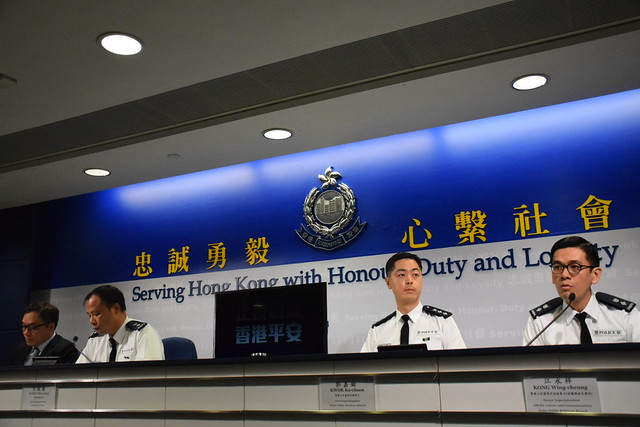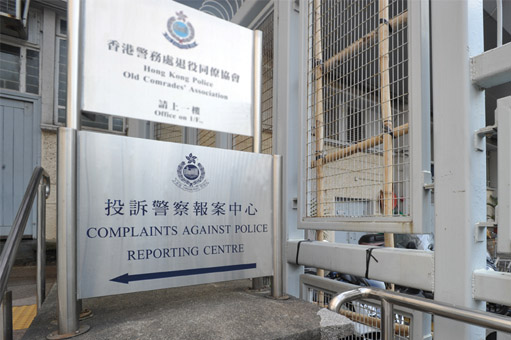One of the distressing features of the past few months has been the increasing resemblance seen by many people between our police force and an occupying army.
Perhaps this is unfair. Perhaps it is unavoidable. That it has happened is beyond dispute. A recent speech by the outgoing Commissioner of Police assured some newly minted cops that they were beloved by the Hong Kong public, citing surveys taken last year.
More recent figures are less encouraging. One recent survey asked respondents to rate their confidence in the Hong Kong force on a scale from zero to ten. Slightly more than half of the respondents chose zero.

People’s view of the police force depends heavily on their most recent encounter with it. When that consisted of a squad of faceless (and numberless) people in head to toe black armour storming into their estate and tear-gassing their dog, well… Not so much an occupying army as an invading one.
Unfortunate and inevitable though this may be, it does mean that this is a most unfortunate time for a renewed emphasis on the paramilitary tone of local police culture. Which brings me to the new C of P’s decision to change the force’s motto.
This used to be “Serving with Pride and Care”. Pride is a nice thing in a uniformed force, and “serving with care” carried the pleasing implication that the force was there to help people, care being something not required by corporations or machines.
The new catchphrase is “Serving Hong Kong with Honour, Duty and Loyalty”. The first part of this is dangerously ambiguous. Which possible Hong Kong are we serving. Is it the people, the government, or the liaison office?

The “honour, duty and loyalty” bit do not help. From a style point of view there is always a feeling that you get a nice rhythm with three items: faith, hope and charity; hatred, ridicule and contempt; liberty, equality, fraternity; fish, chips and peas…
But why this particular trio? According to the some frenzied googling, the phrase first surfaced in a historical novel by one G. P. R. James, published in 1832 and called “Henry Masterton, or the adventures of a young cavalier”. The three qualities cross the mind of a lady contemplating her next move with Mr M.
The trio appears again in an article in the Edinburgh Review of 1855. I cannot resist quoting the whole sentence: “It would be well for us if all our rulers were possessed with the same high feelings of honour, duty, loyalty and devotion which are eminently the characteristics of the country gentlemen of England.”
Very flattering, but no connection with police work. Also off topic is the appearance of the same trio in early editions of “Scouting for Boys”.

In 1995 we have a book called “Honour, Duty and Loyalty”. But I do not think the Commissioner of Police had this book in mind because the second deck of the title is “Introduction to National Socialism”. The motto of the SS was “my honour is called loyalty”, a near miss.
We may also exclude a chapter “Honour, Loyalty, Duty” in what appears to be a dungeons and dragons type of game, published in 2017, and an academic effort called “Honour, Duty and Loyalty to Tradition as a ‘Tragic Flaw’ in Titus Andronicus”, for which I have been unable to establish a date.
We will let pass as too obscure for our purpose the motto of the Mexican navy, which happens to be “honour, duty, loyalty and patriotism”.
So where did this trio come from? I suppose it is an adaptation of the well-known motto of West Point (the American training establishment for army officers), which is “duty, honour, country”. If this had been left unchanged the “country” bit would have caused a problem.

The West Point motto was the theme of a famous speech by General MacArthur, much Youtubed, usually with a specially composed but rather dull piece of military music in the background. It was also adopted with approval by both President Bushes. GW, in a lucid moment: “Leadership to me means duty, honour, country.”
The US Army’s official motto is quite long, but often abbreviated on tee-shirts to “Honour, duty, loyalty”, which is where we came in. Our police force now wants to be known as a paragon of military virtues.
I find this a bit disturbing. Many years ago I was invited to give a little seminar on media matters to a group of police people who were on the brink of becoming inspectors. This must have given satisfaction because I was invited back a few times to address embryo superintendents.
After I had done my thing about the media we usually had a general discussion, in which people complained bitterly of being misquoted and I explained that accurate quoting is harder than it looks. Then I was usually told that there should be a body to which people could complain about iniquitous journalism, to which I replied that I would be “quite happy to have a complaints procedure as long as it is modelled on yours”, which did not go down too well.

Another recurring topic was the question, which was floating about at the time, whether the police force should be renamed a “police service” to reflect the post-colonial change of emphasis from control to service. To my surprise everyone, or at least everyone who dared to speak, was violently against the change.
I was assured that the force really liked being paramilitary and had no intention of changing. At the time this seemed rather an academic question. I should perhaps have suggested, but didn’t, that this was a matter which should be decided by what Hong Kong needed rather than what most police people preferred.
Anyway this has now become a highly relevant question. People calling for the abolition or reform of the police force do not want a society with no police. They want a force dedicated to law as well as order, to service as well as force. There are police forces in the world which can keep an acceptable measure of control over street turbulence without resort to constantly rising levels of violence and the deployment of increasingly intimidating weapons. Why can’t we have one?

There is nothing wrong with serving Hong Kong with “honour, duty and loyalty” – the problem is the things which are left out. Unlike army officers, police people have a duty to the law and the people as well as to the government. Unlike for army officers the question of relations with civilians is not an optional skill for police people; it is the heart of the job.
The job of the military is, as a US Marine memorably put it on his arrival in Iraq, to “do what we are trained to do: blow things up and kill people.” Police people should have other priorities and the motto on their wall should reflect them.
